Overview
The article provides essential tips for individuals preparing to leave a stable job to pursue entrepreneurship, emphasizing the importance of financial preparedness, a solid business plan, emotional resilience, networking, and idea validation. By outlining strategies such as saving at least six months’ worth of living expenses, conducting thorough market research, and leveraging professional connections, the article underscores that thorough preparation significantly enhances the likelihood of entrepreneurial success amidst the uncertainties of transitioning from a stable job.
Introduction
In the dynamic landscape of entrepreneurship, laying a strong financial foundation is paramount for success. Aspiring business owners must navigate the complexities of budgeting and saving, particularly in a climate where personal savings rates have dwindled.
- Establishing a comprehensive budget that encompasses both personal and business expenses can serve as a vital safety net against the unpredictable income fluctuations that often accompany new ventures.
- Moreover, the importance of crafting a robust business plan cannot be overstated; it acts as a strategic roadmap guiding entrepreneurs through:
- Market research
- Operational planning
- Financial projections
As emotional challenges arise during this transition, acknowledging these feelings and seeking support becomes essential for resilience. Building a strong professional network further amplifies the chances of success, providing invaluable resources and connections.
Ultimately, testing and validating business ideas before fully committing can significantly mitigate risks. This article delves into these critical components of the entrepreneurial journey, offering insights and strategies to empower individuals as they embark on their path to financial independence and fulfillment.
Financial Foundations: Saving and Budgeting for Your Entrepreneurial Journey
Before starting your entrepreneurial journey, it’s crucial to establish a solid monetary foundation as outlined in ‘Your Career 2.0: A Survival Guide for The Battered Career Syndrome and Investor Syndrome.’ Start by creating a detailed budget that encompasses both personal and professional expenses. Aim to save at least six months’ worth of living expenses, creating a monetary buffer against the income fluctuations that often accompany new ventures.
This proactive strategy should include:
- Reducing unnecessary expenses
- Channeling those savings into your funding as part of your preparation to leave a stable job for entrepreneurship.
Notably, as of 2023, the personal savings rate in the United States has declined to approximately 4.40 percent from the peak rates of 2020 and 2021, highlighting the need for a strong focus on savings. During your transition, consider extra income sources, such as freelance work or part-time roles, to strengthen your stability as you lay the groundwork for your venture.
This strategy not only strengthens your financial position but also instills the confidence needed for preparing to leave a stable job for entrepreneurship. Remember the wisdom of seasoned entrepreneurs: Don’t give up, and stay open to acquiring new knowledge as a top priority when preparing to leave a stable job for entrepreneurship to maintain and grow your venture. Don’t hesitate to ask for help; building a great business takes time, and the journey is about finishing strong and achieving your goals.
- Coupled with a strategic monetary plan, this mindset emphasizes the importance of perseverance and continuous learning. Moreover, be aware that savings rates and economic practices can differ significantly across countries, providing a broader context for your budgeting and planning efforts. This global perspective will enhance your understanding of the economic foundations necessary for entrepreneurial success.
Furthermore, consider the age factor limitations and the importance of taking control of your destiny as you navigate the challenges of a declining job market.
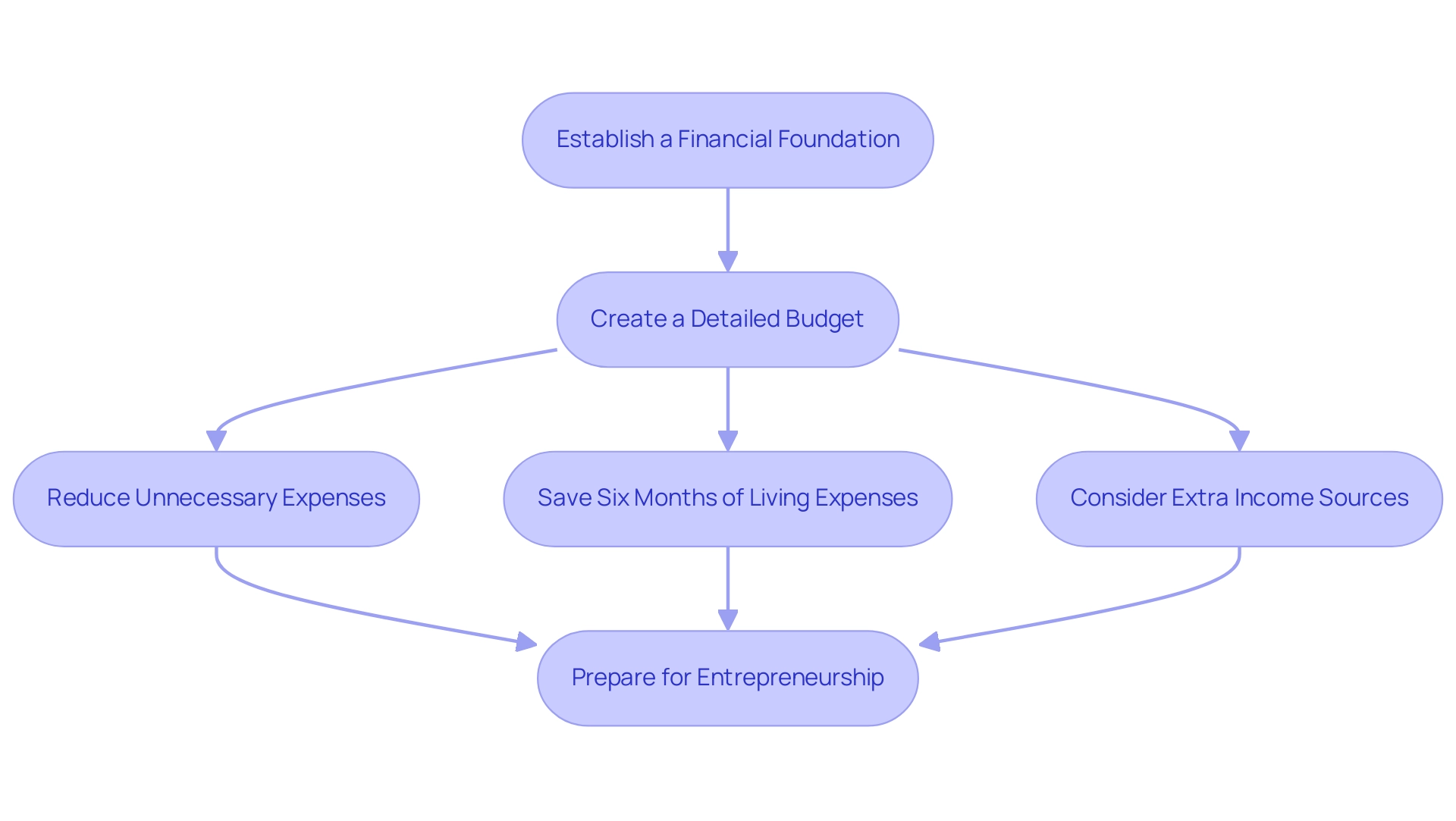
Crafting a Business Plan: Essential Steps for Success in Entrepreneurship
Developing a thorough plan is a crucial step in your entrepreneurial journey, particularly for those who are preparing to leave a stable job for entrepreneurship. Start by expressing your vision, mission, and objectives clearly, as this clarity will direct your path toward economic stability. Undertaking thorough market research is essential; it allows you to grasp the nuances of your target audience and gain insights into your competitors, which is crucial in today’s declining job market.
Your enterprise plan should also detail marketing strategies, operational plans, and revenue forecasts, acting as a roadmap that keeps you focused and organized as you navigate the challenges ahead. Crucially, companies equipped with well-structured plans have reported success rates significantly higher than those lacking them, emphasizing the necessity of preparation in achieving economic independence. In the present economic environment, the typical startup Series A investment in the U.S. has increased from $15.5 million in 2020 to $22.2 million in 2021, emphasizing the significance of a robust plan for obtaining funding.
Moreover, older entrepreneurs, often those transitioning later in their careers, are more likely to succeed; individuals around 50 years old are twice as likely to achieve success compared to their younger counterparts. This demographic insight reinforces the relevance of planning for those seeking to reimagine their personal and professional aspirations. A compelling case study is evident in the FinTech startup landscape, which attracted $81 billion in venture investment in 2022, showcasing many successful partnerships between financial institutions and startups.
A robust plan is a critical asset when pursuing funding or partnerships, as it demonstrates your commitment and readiness to potential investors. Additionally, leveraging transferable skills from your previous career can significantly enhance your organization’s adaptability and innovation. Engaging with your community and building a support network can also provide invaluable resources and encouragement during your transition, which is a top priority when preparing to leave a stable job for entrepreneurship.
As Steve Bennett, a business formation expert, aptly states, ‘With LLCBuddy, you’re not just getting a tutorial; you’re gaining a trustworthy partner for your entrepreneurial journey.’ This partnership highlights the importance of having a solid plan and support system as you embark on this exciting venture toward empowerment and financial freedom.
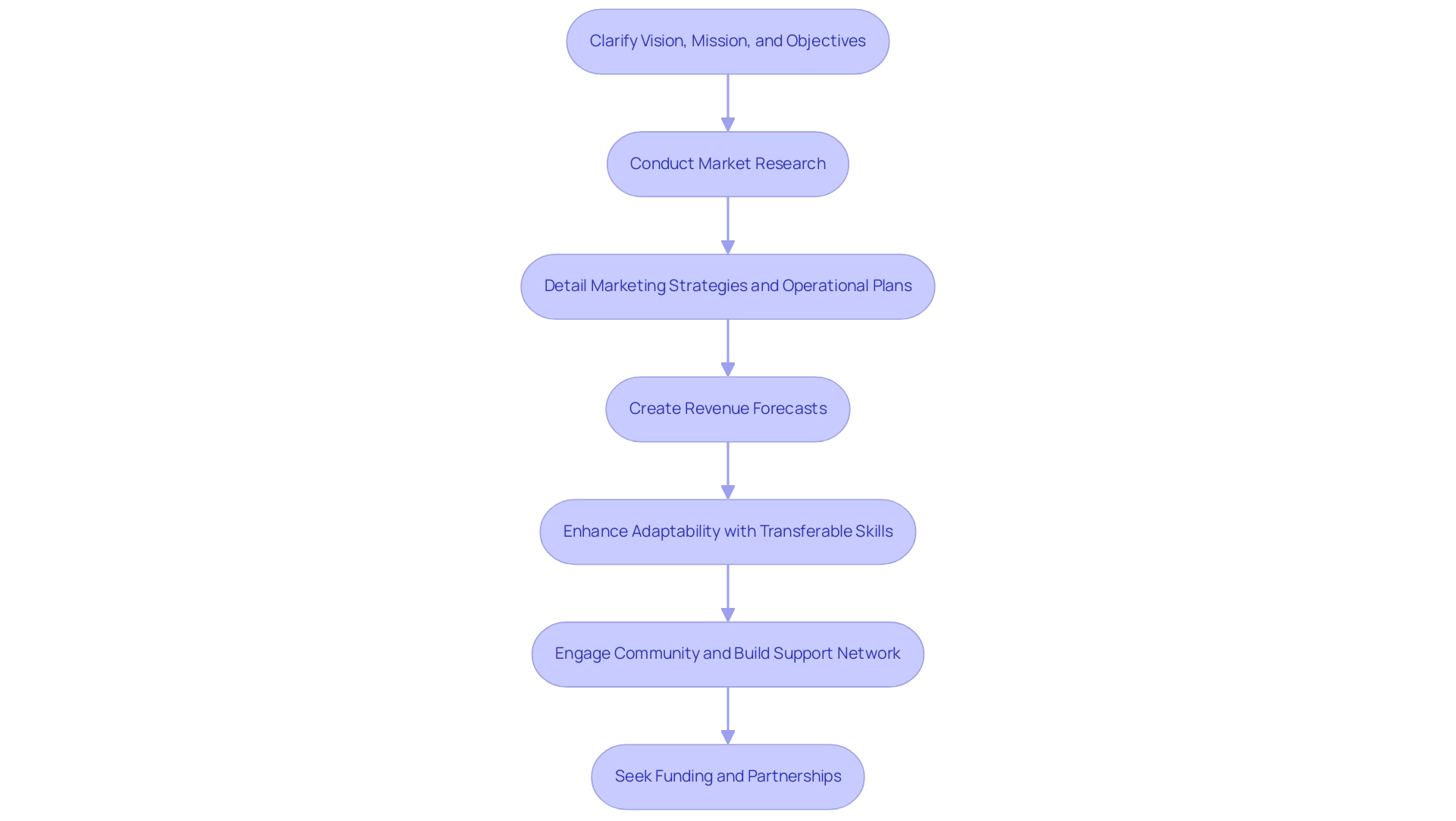
Navigating the Emotional Transition: Preparing for the Shift to Entrepreneurship
Embarking on the journey of entrepreneurship, especially when considering the top preparing to leave a stable job for entrepreneurship, often feels like an emotional rollercoaster filled with peaks of excitement and valleys of fear and uncertainty. It’s essential to acknowledge these feelings as a normal part of the transition, particularly in a declining job market where employability and personal agency are critical. Many new entrepreneurs are at the top of preparing to leave a stable job for entrepreneurship and face emotional challenges; yet, alarmingly, only 18.5% of respondents are aware of mental health resources specifically tailored for their needs.
As Lenka Pitonakova, a Senior Software Engineer and Counsellor for Tech, points out, ‘> That’s some alarming statistics. If you think about it, as an investor or a potential new employee of a startup, you should really be worried when a founder claims that everything is fine and that they are going through the founder life mentally unaffected <‘. This highlights the critical need for entrepreneurs, particularly those at the top preparing to leave a stable job for entrepreneurship, to confront their emotional realities.
To navigate these challenges effectively, consider:
- Journaling to process your thoughts
- Seeking support from a mentor or a peer group of fellow entrepreneurs
- Establishing a routine that includes self-care practices—such as regular exercise or mindfulness—to foster resilience and maintain a positive mindset
Additionally, exploring AI marketing tools, as recommended by Juliet John and her colleagues at Zapier, can significantly enhance your productivity. These tools not only streamline marketing efforts but also allow you to channel your energy more efficiently into overcoming emotional hurdles.
Remember, experiencing ups and downs is part of the entrepreneurial journey; the key lies in staying focused on your long-term objectives while navigating the complexities of top preparing to leave a stable job for entrepreneurship and investor challenges. For further guidance, ‘Your Career 2.0: A Survival Guide for The Battered Career Syndrome and Investor Syndrome’ serves as a comprehensive resource to help aspiring entrepreneurs understand and manage these emotional challenges effectively.
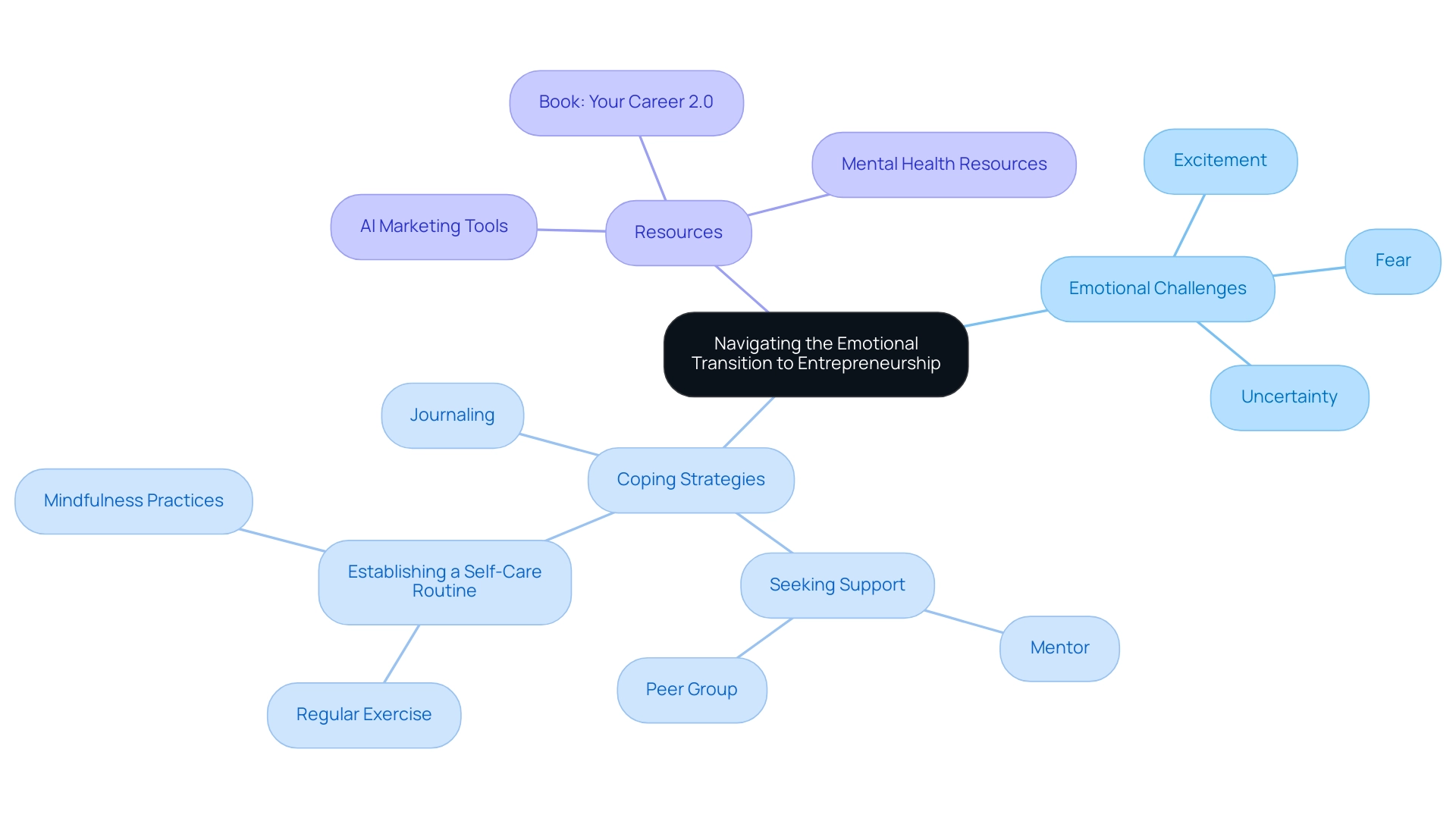
Building Your Network: Leveraging Connections for Entrepreneurial Success
For aspiring entrepreneurs, establishing a robust professional network is essential in navigating the complexities of ownership. An excellent opportunity to do this is at the International Business Ownership Expo, taking place in New York City from May 30th to June 1st, 2024. This premier franchise event connects you with over 300 exhibiting franchise brands, industry experts, and fellow entrepreneurs from 120 countries, all under one roof.
Start by reconnecting with former colleagues, tapping into industry contacts, and engaging with local professional groups. Participating in this Expo, along with other networking events, workshops, and seminars, offers numerous opportunities to meet like-minded individuals and potential mentors who can guide your journey. Current trends show that 66.5% of event professionals plan to adopt hybrid formats as in-person events resume, indicating a shift that expands networking opportunities.
Moreover, statistics reveal that over 40% of in-person meetings in B2B sales result in new customers, showcasing the tangible benefits of face-to-face interactions. Leverage platforms like LinkedIn to connect with professionals in your field, share your entrepreneurial journey, and build your presence. Remember, networking is a two-way street: it’s as much about offering support and sharing knowledge as it is about seeking assistance.
This reciprocal approach can unlock invaluable resources and insights, proving that a well-nurtured network can significantly impact business growth. As noted by Employ Inc., workers often rely on connections, with 18% applying for their current positions through friends or former colleagues. Furthermore, this study highlights that the top preferred communication channels of job candidates include:
- Phone calls
- Text messages
- Social networks
illustrating the diverse ways to maintain connections.
Thus, cultivating authentic relationships within your network can empower your entrepreneurial aspirations and lead to unforeseen opportunities. Furthermore, data from a case study indicate that firms that invest in in-person meetings gain $12.50 for each dollar spent, highlighting the monetary advantages of networking. As life normalizes, returning to in-person networking becomes increasingly relevant, especially for those who are top preparing to leave a stable job for entrepreneurship.
Don’t miss the chance to explore these opportunities at the Expo, where you can discover various franchise options at different investment levels, and consider attending the global book launch event for ‘Your Professional Revolution™’, which focuses on financial self-sufficiency and empowerment.
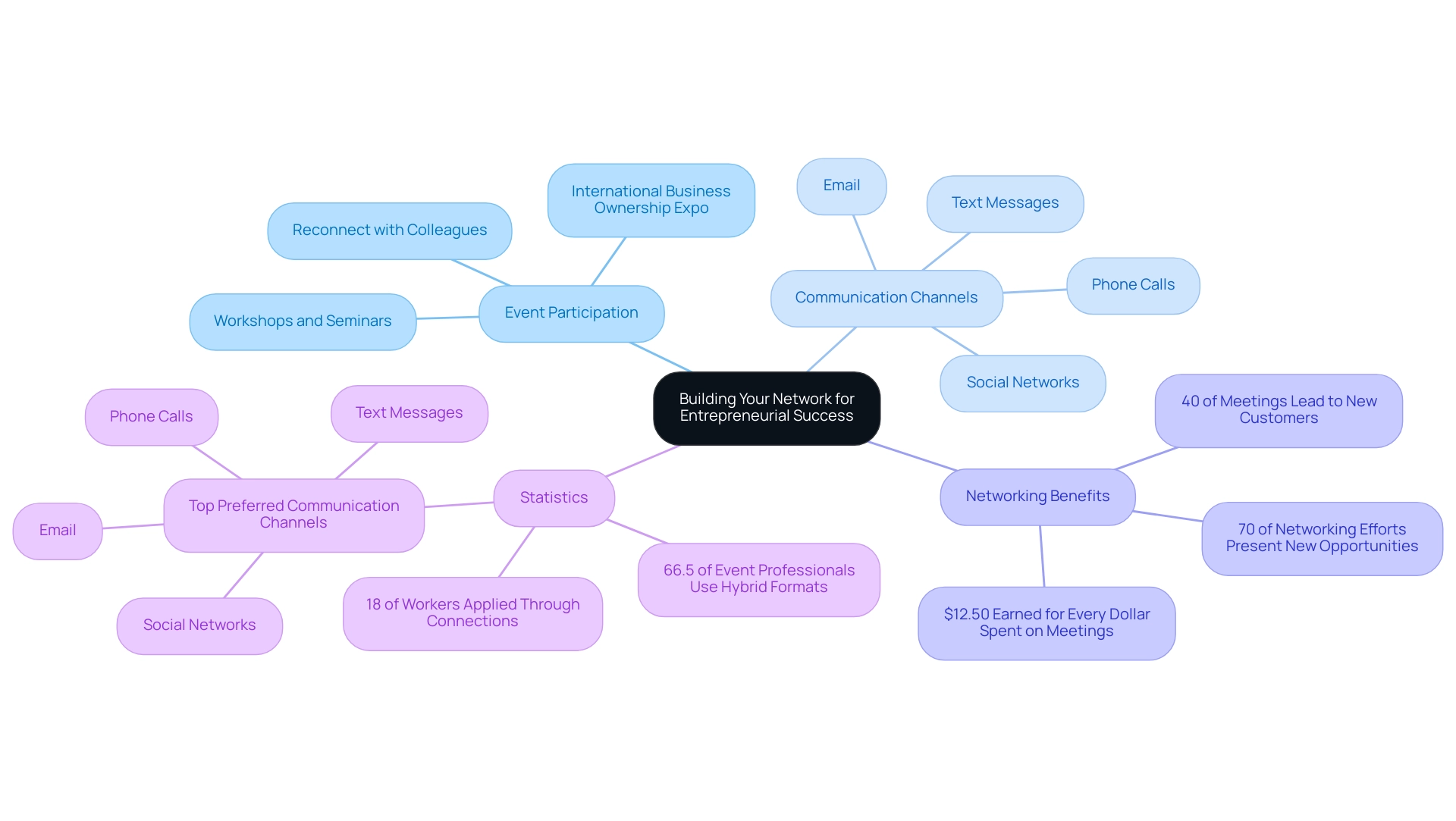
Testing Your Business Idea: Validating Your Concept Before Quitting
Before taking the bold step of preparing to leave a stable job for entrepreneurship, it’s essential to rigorously test and validate your concept as outlined in Your Career 2.0: A Survival Guide for The Battered Career Syndrome and Investor Syndrome. This book serves as a vital resource for anyone looking to navigate their career transition effectively. Begin by conducting surveys or interviews with potential customers to gather critical feedback on your concept.
This initial step allows you to understand your target market better, echoing the wisdom of Cassidy Horton, who advises,
I need to define the specific person that my product will be for, so I can find this person and see if they would want to buy.
Next, consider creating a minimum viable product (MVP) to gauge interest and collect insights. An MVP provides a tangible representation of your idea, enabling you to learn and iterate quickly.
Additionally, running a pilot program or offering your services part-time can help assess demand while refining your offerings based on real-world interactions. Integrating lessons from case studies on common causes of failure—such as cash flow issues and lack of market need—highlights the importance of validating your ideas to avoid these pitfalls. To further assist in this process, the seven ChatGPT prompts can serve as actionable tools for vetting your ideas effectively.
Statistics indicate that organizations that engage in thorough validation processes have a higher success rate, reinforcing the need for a methodical approach. This validation process not only boosts your confidence but also provides you with valuable data to refine your strategy. Ultimately, this structured approach significantly increases your chances of success as you focus on preparing to leave a stable job for entrepreneurship, allowing you to sidestep common pitfalls that lead to business failure.
For more insights and guidance, refer to Your Career 2.0: A Survival Guide for The Battered Career Syndrome and Investor Syndrome as you embark on this journey.
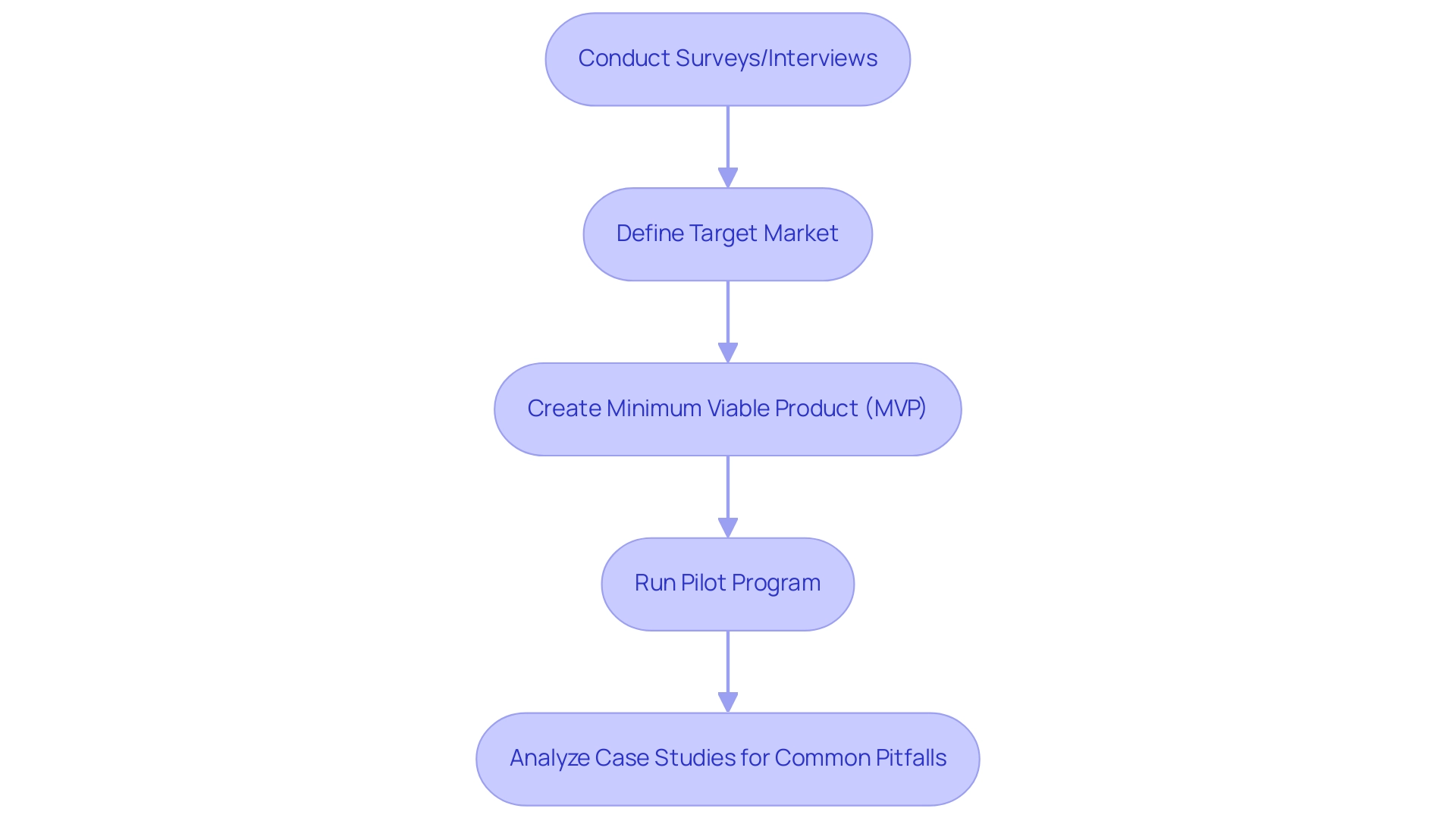
Conclusion
Establishing a solid financial foundation is crucial for anyone embarking on the entrepreneurial journey. By creating a comprehensive budget that encompasses both personal and business expenses, aspiring business owners can better navigate the unpredictable income fluctuations that often accompany new ventures. Coupled with a commitment to saving and exploring additional income sources, this proactive approach instills the confidence necessary to leap into entrepreneurship.
Crafting a robust business plan serves as a strategic roadmap that not only clarifies vision and objectives but also enhances the likelihood of securing funding. Thorough market research and a clear understanding of operational needs are essential for success, particularly in a competitive landscape. Additionally, recognizing the emotional challenges of this transition and seeking support through networking and mentorship can significantly bolster resilience and foster growth.
Validating business ideas before fully committing is another key step that can mitigate risks and enhance success rates. Engaging with potential customers and refining offerings based on their feedback ensures that entrepreneurs are well-prepared to meet market demands. By embracing these strategies—financial planning, thorough research, emotional resilience, and idea validation—individuals can significantly increase their chances of achieving financial independence and fulfillment in their entrepreneurial pursuits. The journey may be challenging, but with the right tools and mindset, success is within reach.


